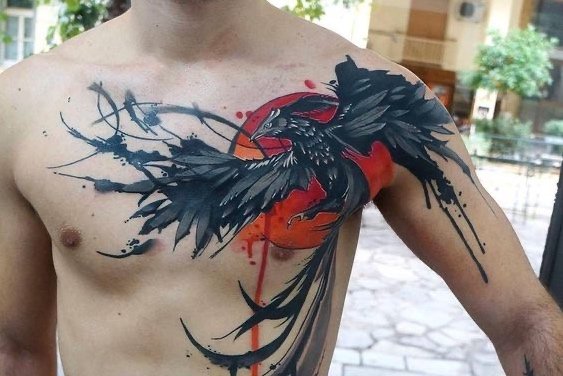

In the world of tattoos, there are countless styles that capture the imagination and creativity of both artists and enthusiasts. One such style that has gained significant attention and popularity in recent years is Trash Polka. Known for its striking visual impact and unique aesthetic, Trash Polka tattoos have emerged as a powerful medium for self-expression. This article explores the origins, characteristics and significance of Trash Polka tattoo style.
Trash Polka was born in Germany around 2009, credited to the collaboration between tattoo artists Simone Pfaff and Volko Merschky. Inspired by their shared love for fine art, graphic design and photography, they sought to create a style that challenged the norms and blended various artistic influences. The name “Trash Polka” itself reflects the fusion of different elements. “Trash” represents the chaotic, raw and unconventional aspects, while “Polka” alludes to the precision and structured nature of music.

Trash Polka tattoos are characterized by their bold, high-contrast appearance, combining realistic imagery with abstract, chaotic elements. The style incorporates both black and red ink, with occasional touches of other colors for added impact. The designs often feature fragmented and overlapping elements, such as splatters, smudges, geometric shapes, typography and photorealistic portraits.
What sets Trash Polka apart is the technique employed by artists to create the desired effect. Artists use a variety of methods, including brushstrokes, splatters and drip effects, to create a sense of controlled chaos. The juxtaposition of sharp lines and organic forms creates an intriguing visual tension. Additionally, the style often incorporates stencil work, which enhances the graphic quality of the design.
Themes and Symbolism
Trash Polka tattoos explore a wide range of themes, often reflecting personal experiences, emotions, and philosophical concepts. From abstract interpretations to intricate narratives, the style encourages storytelling through ink. Themes such as love, loss, passion, rebellion and existentialism find their expression in the chaotic yet harmonious compositions.
Significance and Emotional Expression
Trash Polka tattoos are more than just visually striking designs—they serve as deeply personal expressions of the wearer’s journey and emotions. They capture fragments of memories, hopes and dreams, encapsulating the complexities of life in a single artwork. The unique blend of realism and abstraction allows for a dynamic representation of the human experience, evoking strong emotions and inviting contemplation.

Ideal Placement for Trash Polka Tattoos
Trash Polka tattoos are best suited for larger canvas sizes, allowing artists to incorporate intricate details and accompanying typewriter-style fonts. The chest serves as an excellent flat canvas option, offering ample space to showcase the complexity of a trash polka design. Alternatively, opting for a full or half sleeve allows for a larger area to accommodate the surreal level of detail that characterizes this style. Smaller areas may struggle to support the intricacies of a trash polka tattoo, as the style thrives on its ability to incorporate a multitude of elements. However, one can consider placing the design on the arm while extending certain elements onto other parts of the body, such as the ribs or chest. This approach creates a sense of flow and dynamism within the piece, enhancing the overall visual impact.
The Meaning of Trash Polka Tattoos
The meaning of a tattoo ultimately resides in the individual’s personal interpretation and connection to it. Nevertheless, trash polka designs have the power to evoke specific emotions in viewers. The juxtaposition of realism and “trash” within these designs creates a contrasting experience when observing the art. Trash polka often delves into opposing concepts, such as brutality versus passion or technology versus humanity, amplifying the range of emotions it can evoke.
Moreover, trash polka designs can also explore the passage of time, as visible emotions are frequently intertwined within the artwork. While the word “aggressiveness” is commonly associated with this art style due to the depicted imagery and the saturated red and black color palette, it is important to note that not all trash polka designs are intended to evoke negative or aggressive emotions.
However, some certainly incorporate these elements intentionally. In essence, the emotional impact of trash polka tattoos is subjective and varies from person to person. These designs have the ability to provoke a spectrum of feelings, from intensity and aggression to introspection and contemplation. The contrasting elements and vivid color choices contribute to the visual and emotional power of trash polka, offering a unique platform for self-expression and conveying complex ideas through tattoo art.